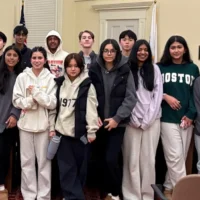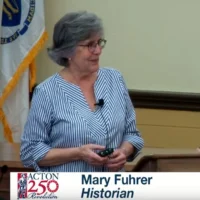Acton’s inaugural event commemorating the 250th Anniversary of the Commencement of the American Revolution took place at Town Hall on the evening of Thursday, September 21. Organized by the Acton 250 Committee, created by the Select Board in August of last year to plan community events to mark this anniversary, this lecture by noted historian Professor Robert Allison, is the first in a Speaker Series, and was dedicated to the late Patricia Herdeg, beloved community member and Acton Historical Society Secretary.
The Francis Faulkner room was packed with 133 people in the room, and another 36 viewing the live-stream. Three high school history classes were among the attendees, each student earning extra credit for US History and Government I or AP European History. Several 250 Committee members attended, to run the event or simply enjoy the presentation: Chair Steve Trimble, History Subcommittee Chair Pam Lynn representing the Acton Libraries, Anne Forbes representing Iron Work Farm, Bob Ferrara representing Friends of Pine Hawk, Bill Klauer representing the Acton Historical Society, Dean Charter, the Select Board representative who wrote the committee’s charge, Sue Peterman, and Mary Price Maddox, the Acton Boxborough Regional School District representative.
Professor Allison was a dynamic speaker, holding the audience’s attention with his in-depth knowledge of the events surrounding the “Destruction of the Tea” in 1773 and story-weaving skill. His wit was appreciated by students and seniors alike, most of the students sitting rapt, a handful taking notes. Allison noted that the event we now know as the “Boston Tea Party” was not given that name until some 50 years after the night that more than 300 chests of tea were split open with axes, dumped overboard into the Boston Harbor, the tea pushed under water to spoil it. Historians estimate that roughly 9,000 pounds worth of tea were destroyed that night, over one million in today’s dollars. John Adams called it “the most magnificent Movement of all.” in his diary entry of December 17, 1773. Parliament did not agree, and in 1774, the Massachusetts Charter was suspended, Boston’s port was shut down, and General Thomas Gage, the commander of British military forces in North America, was sent to replace Governor Hutchinson in an attempt to keep the colonists in line.
Allison recalled hearing a story that during Queen Elizabeth II’s visit on the occasion of the Bicentennial, a cheeky American handed her a check for $9000, explaining, “This is for the tea.” The Professor reminded the audience that the salt-water logged tea was not a loss for the Queen’s family, but for the East India Company and Parliament, who had authorized a monopoly to the Company to sell tea to the North American colonies in an effort to pull them out of a very large debt. Allison concluded his presentation by reminding the audience that the American Revolution was about ordinary folks determining how they were to be governed, and a particular reminder for the students in the audience was that knowledge about defending their rights would serve them, not only for the test they’d take next month, but for the rest of their lives.
For those who missed the lecture, the recording is available to view on Acton TV’s YouTube channel. The series continues with a presentation, “Daily Life in Colonial Acton,” by local historian Dr. Mary Fuhrer on Monday, November 13 at 7:00 PM in Room 204 of Town Hall.

A packed Francis Faulkner Room at Acton Town Hall. Photo: Alissa Nicol


